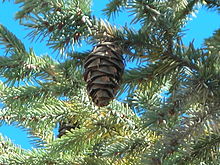Pseudotsuga menziesii var. lindleyana
| Mexican Douglas-fir | |
|---|---|

| |
| Mexican Douglas-fir branch with cones | |
| Scientific classification | |
| Kingdom: | Plantae |
| Clade: | Tracheophytes |
| Clade: | Gymnospermae |
| Division: | Pinophyta |
| Class: | Pinopsida |
| Order: | Pinales |
| Family: | Pinaceae |
| Genus: | Pseudotsuga |
| Species: | |
| Variety: | P. m. var. lindleyana
|
| Trinomial name | |
| Pseudotsuga menziesii var. lindleyana | |
| Synonyms | |
| |
Pseudotsuga menziesii var. lindleyana, commonly known as the Mexican Douglas-fir, is a conifer in the genus Pseudotsuga that is endemic to Mexico.[1] DNA sequence[2] and morphological[3] evidence suggests it is most closely related to Rocky Mountain Douglas-fir (P. menziesii var. glauca) and might best be treated as an additional variety within P. menziesii.[1]
Distribution
Pseudotsuga menziesii var. lindleyana is native to the Sierra Madre Occidental, Sierra Madre Oriental, and scattered mountains as far south as Oaxaca. The Mexican Government lists Mexican Douglas-fir as "subject to special protection"[4] because its populations are small, isolated and show signs of low fertility and recruitment due to inbreeding depression.[5][6]
References
- ^ a b Earle, C.J. "The Gymnosperm Database: Pseudotsuga lindleyana". Retrieved 9 January 2018.
- ^ Gugger, Paul F.; González-Rodríguez, Antonio; Rodríguez-Correa, Hernando; Sugita, Shinya; Cavender-Bares, Jeannine (2011). "Southward Pleistocene migration of Douglas-fir into Mexico: phylogeography, ecological niche modeling, and conservation of 'rear edge' populations" (PDF). New Phytologist. 189 (4): 1185–1199. doi:10.1111/j.1469-8137.2010.03559.x. PMID 21118265. Archived from the original (PDF) on 2015-02-20.
- ^ Reyes-Hernández, VJ; Vargas-Hernández JJ; López-Upton J; Vaquera-Huerta H (2006). "Phenotypic similarity among Mexican populations of Pseudotsuga Carr" (PDF). Agrociencia. 40 (4): 545–556.
- ^ Norma Oficial Mexicana NOM-059-SEMARNAT-2010, Protección ambiental-Especies nativas de México de flora y fauna silvestres-Categorías de riesgo y especificaciones para su inclusión, exclusión o cambio-Lista de especies en riesgo (PDF). Mexico City: Secretaría de Medio Ambiente y Recursos Naturales. 2010.
- ^ Mápula-Larreta, M.; López-Upton, J.; Vargas-Hernández, J. J.; Hernández-Livera, A. (2007). "Reproductive indicators in natural populations of Douglas-fir in Mexico". Biodiversity and Conservation. 16 (3): 727–742. doi:10.1007/s10531-005-5821-y.
- ^ Velasco-García MV, López-Upton J, Angeles-Pérez G, Vargas-Hernández JJ, Guerra-de la Cruz V (2007). "Pseudotsuga menziesii seed dispersion in populations of central Mexico" (PDF). Agrociencia. 41 (1): 121–131.
External links
![]() Data related to Pseudotsuga menziesii var. lindleyana at Wikispecies
Data related to Pseudotsuga menziesii var. lindleyana at Wikispecies
- The Gymnosperm Database: Pseudotsuga lindleyana - Old Classification
- The Gymnosperm Database: Pseudotsuga lindleyana in Pseudotsuga menziesii var. glauca - New Classification
